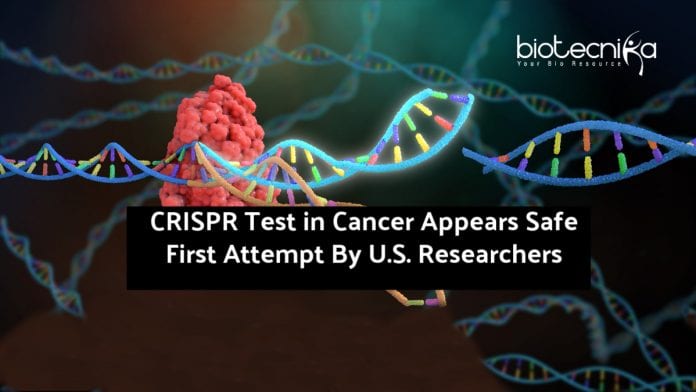CRISPR Test in Cancer Appears Safe – First Attempt By U.S. Researchers
On Thursday, the U.S. researchers reported in the journal Science that their first test of the CRISPR gene-editing tool in cancer research appears to be safe, however, it is still too soon to know whether it is effective.
At Berkeley, Jennifer Doudna of the University of California, who pioneered the gene-editing technique, and Jennifer Hamilton, her colleague write in an editorial, “The potential to accelerate the development of cell-based therapies is highlighted in the findings and it represents an important advancement in the therapeutic application of gene editing.”
As CRISPR is easy to use compared with older techniques, doctors have started testing it in treating a number of diseases and thus, this approach has quickly become the preferred method of gene editing in research labs.
In this study, CRISPR-Cas9 is used and it works like a pair of molecular scissors targetting and trimming away parts of the genome and with new stretches of DNA replaced.
In clinical trials, CRISPR has already proven to be beneficial at editing the genes of patients with beta-thalassemia and sickle cell disease.
In Philadelphia, Dr. Edward Stadtmauer of the University of Pennsylvania and colleagues tested it in three patients having advanced cancers, in the latest study. One had sarcoma, cancer that attacks the connective tissues and the other two had the blood cancer multiple myeloma.
With a type of immunotherapy, in which scientists harvest T-cells from a patient’s immune system and reprogram them to attack cancer cells and then infuse them back into patients, the researchers incorporated the use of CRISPR along with this.
Long-lasting remission in patients with blood cancers can be produced by engineered T cell therapies like CAR-T therapy (or chimeric antigen receptor T cell therapy). However, it is possible for the immunity to decrease causing serious side effects and the treatments do not work for many other kinds of cancer.
To address some of those issues, Stadtmauer and colleagues seek to use CRISPR. They used the CRISPR-Cas9 system to delete genes from the cells that might hamper the immune system’s ability to fight cancer from patients’ blood and then make the cells to attack cancer cells by engineering the cells to recognize and attack.
These cells were then infused back into the patients and checked if they would multiply. There have been no toxic side effects observed by the researchers so far. After the infusion, in all of the patients, the engineered T-cells began growing and up to nine months, the cell lasted.
Doudna writes, ” It was not known until now whether the CRISPR-Cas9 edited T cells once reinfused into a human, will be tolerated and thrive or not. The question of whether the CRISPR-edited, engineered T cells are effective against advanced cancer remains the big question that remains unanswered by this study.”
To test for its efficacy, larger trials will be needed and this pilot study was designed to track safety. One patient had advanced cancer and died from it while the other two patients were undergoing other treatments at the end of the trial.
This technique has been shown to create some “off-target” or unintended edits in the genome and this a key concern with CRISPR-edited cells.
An immunologist at the University of Pennsylvania who pioneered CAR-T cell therapy, Dr. Carl June, the study’s co-author said that two off-target effects were found.
One of the two off-target effects was a rare chance in the DNA code that occurred in 1 in 1,000 of the edited cells and the other was a chromosome reattaching itself to the wrong chromosome, a chromosome translocation.
June said, ” In fewer than 1.5 percent of the infused cells, such effects occurred. The correctly edited genes and the infused cells with these unintended edits did not survive.”
“There are no firm plans at this point though we hope to work with companies to advance this.”

